TL;DR
In this AdvantEdge Guide, we discuss how the lack of trust in recent months is largely due to lack of physical interaction and the negative effects of the pandemic. The author then provides a step-by-step guide for leaders to reinforce the foundations of safety, belonging, and mattering in order to rebuild trust and collaboration. This involves honest communication, using names, recognising individuals and their contributions, and reducing cortisol with deep breathing exercises. By rebuilding the sense of safety, belonging and mattering, trust can be restored, allowing collaboration to thrive.
Purpose: Trust has flat-lined in recent months, thanks largely to the lack of physical interaction. Plus the small detail that this pandemic has massively damaged the global economy threatening jobs and business survival. And without trust, there's no chance of collaboration (in spite of all the wonderful tools to support it) even though we need to do so now more than ever if we are to rebuild our businesses, the economy and lives. In this edition, we'll consider why our brains have decided not to trust others and what leaders can do to rebuild the essential foundations that make trust, and hence collaboration, truly possible. In the next edition, we'll build on these foundations and learn how to leverage the four collaboration styles in the team. In the third of this series, we'll be asking if your technical excellence is holding you back.
Payoff: By understanding what is happening in the brain, leaders can deliberately rebuild the essential foundations of safety, belonging and mattering that every human being craves unconsciously before they are able to trust others and begin the needed collaborative partnerships that will set you in the road to recovery and the ability to thrive in the future.This year has taught us a lot.We've learned that Zoom's mute button can be a best friend or worst enemy, toilet paper is more precious than gold, and no matter how independent we think we are, as Dr John C Maxwell tells us:
One is too small a number to achieve greatness
We need to work in teams and if we don't promote true collaboration we undermine our potential and erode the best efforts of the people with whom we work. If we want to accomplish anything significant, we must learn how to build trust and effect collaboration.
Getting team members to trust each other and collaborate is difficult enough when we work in the same space together. When the team are scattered across the globe, and we communicate through the Interweb it creates an even bigger demand on team leaders to make it work.As I've shared in several recent episodes of the Leadership AdvantEdge, trust has essentially flat-lined during the Covid Pandemic and it’s not improved much since.
In large part it's because the virtual world debilitates our mirror neurons and hence our empathy takes a holiday. I miss the signals of your body language either because I can't see them or the delay makes them incongruous.
This amps up the stress hormones. And your vocal inflection is flattened by the audio compression, so I can't quite tell if you were serious in what I heard as a curt response.
And I cannot see your hands let alone reach out and shake yours firmly and assure your frightened unconscious Critter brain that I'm not carrying a weapon and no, I don't intend to eat you for lunch.
You say, don't be daft John, of course I don't think you're going to eat me for lunch. And that's exactly the problem, you don't THINK it because it's not a conscious process, but your Critter brain is continuously verifying the data and that's simply exhausting.Working in the virtual world is more stressful, filled with massive miscommunication potential, flat, boring, frightening and exhausting.And there's more...We've all lost a sense of control, we have no idea when, or even if, this is going to end, and we can't do half the things we want to. Everyone is concerned for their job security, health, family, bill payments and the list goes on.
But wait. There's some good news. And it's not the untested vaccine which may or may not have a chip inside that is going to give Bill Gates total control over your life...The good news is that leaders can rebuild the trust and collaboration needed to not just survive, but to thrive. And that leader is you. Whether you have the job title matters not a jot.
Leadership is a choice you make, not a position you sit.
All we have to do is fix three things to rebuild the foundations that make trust and collaboration possible.
Cultural Foundations of Safety, Belonging and Mattering that make trust and collaboration possible
Every human being (every single one) craves three things: We all want to feel safe, to feel that we belong to a tribe or group, and we want to know that we matter in this world.
The wise leader knows that these three have to be fixed before they can expect team members to trust one another, let alone collaborate.
For me to trust you in my team I have to feel safe with you, and that we're on the same team. And you need to feel safe with me, that we are together in the same team. And we both need to know that what we are doing individually and together actually matters.
Remember that your brain's primary job is to keep you in the "not dead" state. You have to take care of your physiological needs, food, shelter, water, reproduction and then, your brain is free to focus on your three primal drivers: Am I safe? Do I belong? And, Do I matter?And since we crave these three things: safety, belonging and mattering. Trust and collaboration cannot happen until I know for sure that I am safe, that I belong and that I matter!
Trust has been seriously eroded in the virtual world, but, as humans, we have a secret weapon - our smart brain! My feeling less than safe is because my Critter brain is getting flooded with stress chemicals, mostly cortisol and norepinephrine (adrenaline). It's a pretty constant state of low-level stress induced by the environment (the concerns about the outside world and the paucity of appropriate feedback in the virtual world). Trust in Uncertain Times describes the neuroscience of trust and how fickle trust is for the human brain.
Three ways leaders can help re-build the feelings of safety, belonging and mattering is by over-communicating it.
Honest and truthful communication about the future being a safe and better place. Not hiding pertinent information or glossing over real concerns — address those concerns openly and candidly always focused on what you, as a team, can and will do about it.
If your future is not going to be a safe or better place, you should be candid and honest and clear about what the future holds. Everyone already knows that you don't know for sure and misleading people now will lose trust forever. But maybe, just maybe, one or more of your team might think of a pivot strategy and turn certain doom into possibility and hope. And if I can't have better and safe for sure, I'll take hope for a better future any day.
Increase the sense of belonging by bringing people together and making sure that everyone, every single person, is included by name. Using names matters in the real world and more so in the virtual world.
Don't know their name? Stop hemming and avoiding... ask them. Admit you were an eejit for not knowing and correct the situation.
Recognising individuals (again, by name) and specifically what they have done and how that helps towards the goal and purpose, will improve their belief that they matter and what they do, matters.
Don't know something specific. Observe them and make a note. If it's too late, ask them what have they specifically done that deserves recognition. It's nothing like as powerful but it will do in the interim.
Remember, these are feelings or beliefs are triggered in large part by a reduction of cortisol and adrenaline, and an increase in dopamine and serotonin and oxytocin (See Trust in Uncertain Times for more details). These are influenced by your communication.If your situation is particularly fraught with anxiety, then practice (and teach) the Astonishing Power of the Pause with the deep breathing exercises to reduce cortisol.
Only by rebuilding the sense of safety, belonging and mattering can you then rebuild the levels of trust and gain the synergies of collaboration that you are going to need to thrive in the future.
If you need an outside voice with a fresh perspective to challenge and empower you, your team, or business to a new level of performance and engagement then let’s talk now.


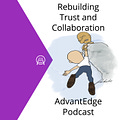


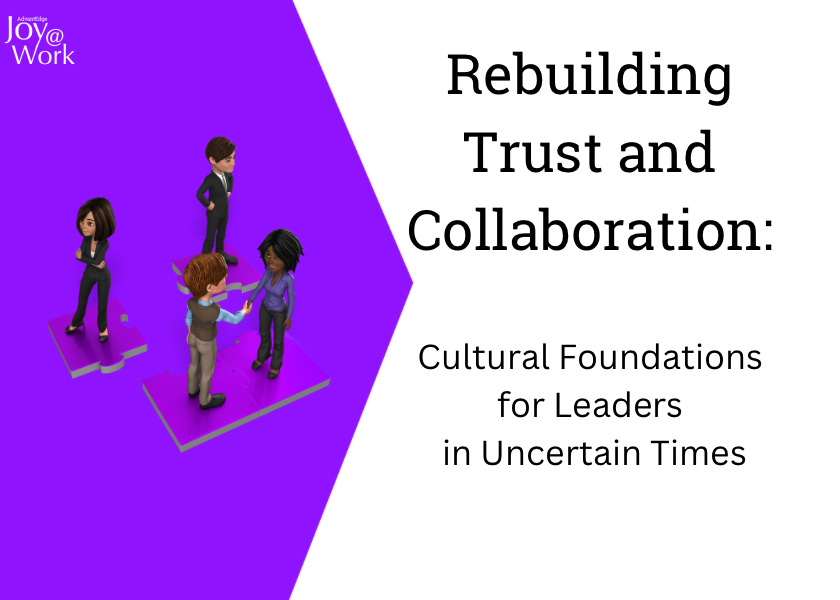






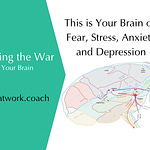
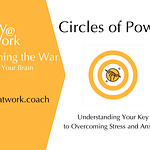
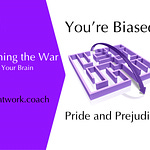
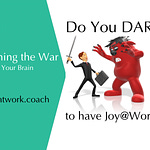
Wise leaders know to fix these three things before expecting trust and collaboration in their team.